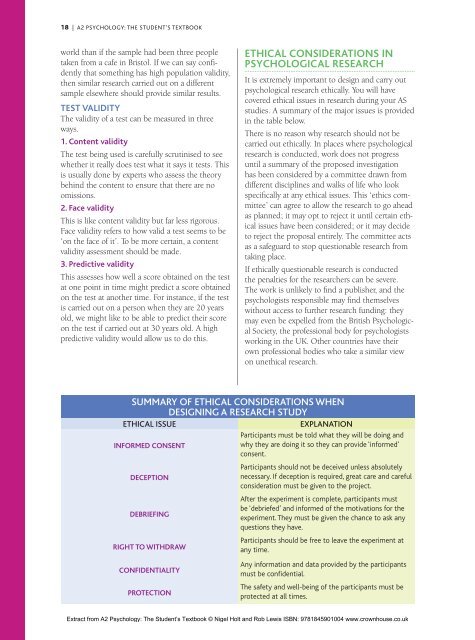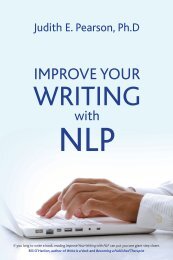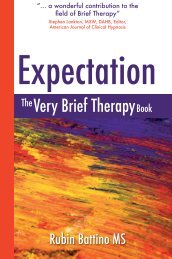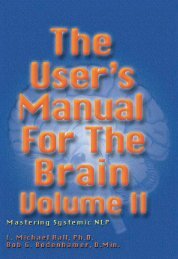Nigel Holt and Rob Lewis - Crown House Publishing.
Nigel Holt and Rob Lewis - Crown House Publishing.
Nigel Holt and Rob Lewis - Crown House Publishing.
You also want an ePaper? Increase the reach of your titles
YUMPU automatically turns print PDFs into web optimized ePapers that Google loves.
18 | A2 PSYCHOLOGY: THE STUDENT’S TEXTBOOKworld than if the sample had been three peopletaken from a cafe in Bristol. If we can say confidentlythat something has high population validity,then similar research carried out on a differentsample elsewhere should provide similar results.Test validityThe validity of a test can be measured in threeways.1. Content validityThe test being used is carefully scrutinised to seewhether it really does test what it says it tests. Thisis usually done by experts who assess the theorybehind the content to ensure that there are noomissions.2. Face validityThis is like content validity but far less rigorous.Face validity refers to how valid a test seems to be‘on the face of it’. To be more certain, a contentvalidity assessment should be made.3. Predictive validityThis assesses how well a score obtained on the testat one point in time might predict a score obtainedon the test at another time. For instance, if the testis carried out on a person when they are 20 yearsold, we might like to be able to predict their scoreon the test if carried out at 30 years old. A highpredictive validity would allow us to do this.Ethical considerations inpsychological researchIt is extremely important to design <strong>and</strong> carry outpsychological research ethically. You will havecovered ethical issues in research during your ASstudies. A summary of the major issues is providedin the table below.There is no reason why research should not becarried out ethically. In places where psychologicalresearch is conducted, work does not progressuntil a summary of the proposed investigationhas been considered by a committee drawn fromdifferent disciplines <strong>and</strong> walks of life who lookspecifically at any ethical issues. This ‘ethics committee’can agree to allow the research to go aheadas planned; it may opt to reject it until certain ethicalissues have been considered; or it may decideto reject the proposal entirely. The committee actsas a safeguard to stop questionable research fromtaking place.If ethically questionable research is conductedthe penalties for the researchers can be severe.The work is unlikely to find a publisher, <strong>and</strong> thepsychologists responsible may find themselveswithout access to further research funding: theymay even be expelled from the British PsychologicalSociety, the professional body for psychologistsworking in the UK. Other countries have theirown professional bodies who take a similar viewon unethical research.SUMMARY OF ETHICAL CONSIDERATIONS WHENDESIGNING A RESEARCH STUDYETHICAL ISSUEINFORMED CONSENTDECEPTIONDEBRIEFINGRIGHT TO WITHDRAWCONFIDENTIALITYPROTECTIONEXPLANATIONParticipants must be told what they will be doing <strong>and</strong>why they are doing it so they can provide ‘informed’consent.Participants should not be deceived unless absolutelynecessary. If deception is required, great care <strong>and</strong> carefulconsideration must be given to the project.After the experiment is complete, participants mustbe ‘debriefed’ <strong>and</strong> informed of the motivations for theexperiment. They must be given the chance to ask anyquestions they have.Participants should be free to leave the experiment atany time.Any information <strong>and</strong> data provided by the participantsmust be confidential.The safety <strong>and</strong> well-being of the participants must beprotected at all times.Extract from A2 Psychology: The Student’s Textbook © <strong>Nigel</strong> <strong>Holt</strong> <strong>and</strong> <strong>Rob</strong> <strong>Lewis</strong> ISBN: 9781845901004 www.crownhouse.co.uk

















